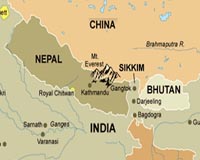| . |  |
. |
Ny-Aalesund, Norway (AFP) Sept 1, 2009 UN Secretary General Ban Ki-moon said Tuesday he was "alarmed" by the rate at which the Arctic's glaciers are retreating as he visited the region ahead of key climate talks in December. Ban said world leaders had a "moral political responsibility" to safeguard the future of the planet. "I am very much alarmed and surprised to have seen these glaciers all worn," he told journalists as he visited the Ny-Aalesund climate change research station in the Svalbard archipelago, located 1,200 kilometres (745 miles) from the North Pole. "Unless we take urgent action to stem this trend, we maybe virtually ice-free by 2037, even by 2030," he said. Ban, a former South Korean foreign minister, is on a two-day trip to the Arctic to see first-hand the effects of climate change ahead of international climate talks in Copenhagen in December. He is the first UN chief to visit the Ny-Aalesund research station, an advisor at the Kings Bay company which runs the site, Bendik Eithun Halgunset, told AFP. World leaders will gather at a UN climate summit in December to try to seal a new international accord on fighting climate change after the Kyoto Protocol requirements expire in 2012. Ban, who visited the Polar Ice Rim aboard a Norwegian coastguard vessel on Tuesday, said politicians must act now. "We have a moral political responsibility for our future and for the whole of humanity, for even the future of our planet." "This Arctic is the place where this global warming is happening much faster than any other region in the world. It looks like it's seemingly moving in slow motion but it's moving faster and faster. Much faster than expected," he added. The UN chief visited the Zeppelin atmospheric measuring station on Ny-Aalesund which records the level of carbon dioxide, other greenhouse gases and pollutants in the air. "Over the past two years, we've suddenly seen a very big increase in methane gas," Kim Holmen, research director at the Norwegian Polar Institute, told Ban as he showed him around the station. Methane is one of the greenhouse gases that contributes to global warming. Anywhere between 15 and 180 international researchers work at the research station depending on the season, in fields often linked to climate change such as atmospheric studies, land and marine biology, glaciology, geodesy and oceanography. Ten countries have scientific bases at the station, where mobile phones are prohibited so as not to disturb the measurement instruments: Britain, China, France, Germany, India, Italy, Japan, The Netherlands, Norway and South Korea. Holmen warned that glaciers are melting at an increasing rate, releasing massive amounts of fresh water in the oceans and disrupting the Gulf stream -- a flow of water in the Atlantic that has a major impact on the planet's weather system. Ban hopes to use his experience in Svalbard to convince the international community about the dangers of climate change at the Copenhagen summit, a meeting he has described as "crucial." "One of the very important reasons for my coming to Norway is to see first-hand the dramatic changes to the Arctic and to learn what that means for mankind," he said in Oslo on Monday before departing for Svalbard. In order to prepare for the Copenhagen talks, the UN plans to organise a high-level international meeting in New York on September 22, he said. "I will take all I have learned to the high-level summit meeting." Accompanied by his wife and Norwegian Environment Minister Erik Solheim, Ban is also due to travel to Longyearbyen, the main town in the archipelago, on Wednesday to tour a vault carved into the Arctic permafrost and filled with samples of the world's most important seeds. Dubbed the "Noah's Ark" of food, the vault can hold up to 4.5 million samples that can provide food crops in the event of a global catastrophe. A 1920 international treaty which placed the Svalbard archipelago -- also known as Spitzberg -- under Norwegian sovereignty allows broad access to citizens from signatory countries. Svalbard is twice the size of Belgium. Share This Article With Planet Earth
Related Links Beyond the Ice Age
 Himalayan nations hold first climate talks
Himalayan nations hold first climate talksKathmandu (AFP) Aug 31, 2009 Nepal's prime minister opened the first climate change conference of Himalayan nations on Monday with a warning about the dangers of melting glaciers, floods and violent storms for the region. With 1.3 billion people dependent on the water that flows down from the melting Himalayan glaciers, Prime Minister Madhav Kumar Nepal said cross-border cooperation was essential in tackling the impact ... read more |
|
| The content herein, unless otherwise known to be public domain, are Copyright 1995-2009 - SpaceDaily. AFP and UPI Wire Stories are copyright Agence France-Presse and United Press International. ESA Portal Reports are copyright European Space Agency. All NASA sourced material is public domain. Additional copyrights may apply in whole or part to other bona fide parties. Advertising does not imply endorsement,agreement or approval of any opinions, statements or information provided by SpaceDaily on any Web page published or hosted by SpaceDaily. Privacy Statement |